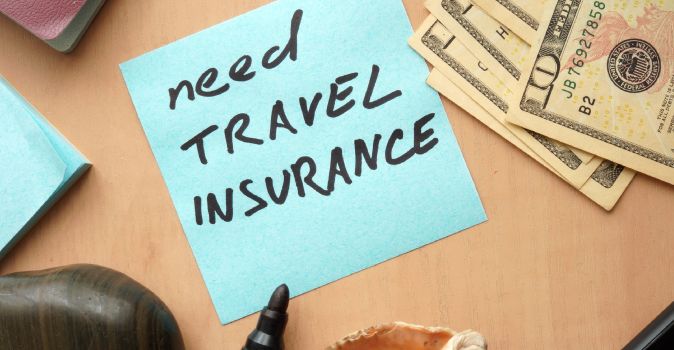Trip cancellation insurance (also referred to, generally, as travel insurance) can provide coverage for unforeseen trip emergencies like losing your luggage, getting hurt, or even getting sick before you travel and needing to cancel your vacation—plus many more unpredictable events that could impact your trip.
Understanding potential costs and benefits can help you decide whether to purchase a trip cancellation insurance plan. You need to know what financial risks you are and are not willing to take to help you decide whether a trip cancellation plan is right for you.
Learn how a trip cancellation plan can provide coverage for common travel mishaps and the unexpected financial burdens you could face during your trip. Discover the ins and outs of your coverage options and how to customize those benefits to fit your needs.
Common Travel Mishaps (and What They Might Cost You)
Travel Mishap #1: Delayed, Damaged, Lost, or Stolen Luggage
Has your checked luggage ever arrived late to your destination? Was it ever lost, stolen, or damaged during your trip? Sometimes it can take days for your mishandled luggage to finally arrive at your accommodations (if it ever arrives), especially when one of your flights is delayed.
It can be frustrating when you realize you have to spend additional time and money picking up necessities like a change of clothes and toiletries or replacing a damaged suitcase. Trip cancellation insurance can mean reimbursement for those necessary expenses.
Benefits to Look For…
- Baggage Delay Benefit – Reimbursement for necessary personal expenses if your checked bag is delayed – often after 12 hours
- Baggage Damage or Loss Benefit – Reimbursement for your personal baggage or effects if they are lost, stolen, or damaged during your trip

Travel Mishap #2: Unexpected Illness Before Departure
It can be impossible to predict that you or one of your travel companions will come down with an emergency illness before a trip. The timing couldn’t be worse. If you need to cancel your trip due to an unforeseen illness, that could mean losing thousands of dollars spent in pre-paid travel expenses – and no refunds.
Amusement park and tour tickets tend to be non-refundable. This could mean wasted money on a tour you never got to take.
A round trip flight to Europe from the U.S. could cost upwards of $2,000. If you purchased your tickets from a third-party vendor like Expedia or Kayak, your tickets may not be refundable. A non-refundable hotel reservation could also mean $100 per night of accommodations you could no longer use.
Your trip cancellation insurance will provide reimbursement for non-refundable expenses if you cancel your trip for a covered reason.
Benefit to Look For…
- Trip Cancellation Benefit – Reimbursement for pre-paid, non-refundable expenses if you cancel your trip for a covered reason
What Is a Covered Reason for Trip Cancellation?
Covered reasons for trip cancellation often include situations like:
- You become sick before your trip and your physician advises you to cancel the trip
- You are involved in a traffic accident while en route to your flight to leave for your trip
- Bad weather causes your airline to cease services for 12+ hours
Check the full policy documents for any plan you are interested in purchasing to see all the covered reasons for a trip cancellation.
Travel Mishap #3: Trip Injury and Interruption
Your adventure abroad has the potential to be interrupted due to injury or illness. You may be injured while on a backpacking tour, for example, forcing you to cancel the rest of the trip.
However, your tour may not provide a refund for the days you miss. This could mean a waste of thousands in funds which a trip cancellation plan could reimburse. A change of flights alone could cost up to $750 in change fees from your airline provider.
You may also be left with medical expenses you hadn’t anticipated. Some trip cancellation policies, like the Atlas Journey® plans from WorldTrips, provide coverage for travel medical expenses as well. This coverage is especially important if you’re traveling internationally and your primary medical insurance does not provide coverage abroad or provides limited coverage.
Benefits to Look For…
- Trip Interruption Benefit – Reimbursement for covered expenses, like pre-paid amusement park tickets or non-refundable hotel reservations, if you are unable to continue your trip due to an unforeseen reason
- Emergency Accident & Sickness Medical Expense – Coverage for necessary medical care for an unforeseen medical emergency
Did You Know? Some countries now require visitors to provide proof of insurance for entry. See which countries require travel insurance before your trip.
Does Your Credit Card Provide Coverage?
Some travel credit cards (provided by most major credit card companies and many businesses within the travel industry) also feature trip cancellation benefits.
However, benefits are usually not as extensive as those included in trip cancellation insurance and rarely feature emergency medical coverage. Read about common credit card travel benefits and what you might be missing out on.
Do You Want Coverage for Emergency Medical Expenses?
Some trip cancellation plans provide coverage for emergency medical expenses in addition to coverage for travel-related expenses and covered cancellations. This could be especially helpful if your primary health insurance doesn’t cover you abroad or you want to supplement your coverage as you travel within the U.S.
There are a few common benefits for trip cancellation policies that provide emergency medical coverage:
- Emergency Accident & Sickness Medical Expense Benefit – Coverage for covered medical expenses for emergency treatment of an accidental injury or illness
- Medical Evacuation & Repatriation of Remains Benefit – Coverage for emergency medical evacuation or repatriation of remains during the trip
- Accidental Death and Dismemberment (AD&D) Benefit – Provides a benefit in the event of a loss as a result of an accidental injury or death occurring during a trip
Will Your Primary Health Insurance Cover You Abroad?
Maybe. Your primary health insurance may or may not cover you for medical expenses abroad. Check your policy description or contact your insurance provider for clarity.
It’s important to note that Medicare typically does not cover medical expenses incurred abroad.
Those without coverage abroad may consider a supplementary policy like Atlas Journey.
Know what questions to ask your primary insurance provider about coverage abroad before traveling.
Did You Know You Could Customize Your Coverage?
Your travel insurance plan may even provide a range of coverage options based on your needs. Atlas Journey trip cancellation insurance features three levels of coverage for those planning to travel abroad:
- Atlas Journey® Premier
- Atlas Journey® Preferred
- Atlas Journey® Economy
Some trip cancellation insurance policies (like the Atlas Journey plans) also allow you to upgrade your coverage for benefits like Trip Cancellation for Any Reason (CFAR), Vacation Rental Accommodations, and Rental Car Damage or Theft.
What Is a Trip Cancellation for Any Reason Benefit?
A CFAR benefit can provide reimbursement for paid and nonrefundable expenses (sometimes up to 75% of your total trip cost) if you cancel a trip for a reason not already covered by your policy. This benefit can allow more freedom to those who want the option to cancel their trip for uncovered reasons.
With Atlas Journey, you have the option to upgrade for a CFAR benefit and receive reimbursement for 50% or 75% (your choice) of prepaid, non-refundable payments if you cancel your trip for a non-covered reason.
What Is a Vacation Rental Accommodations Benefit?
A Vacation Rental Accommodations benefit could provide additional coverage to your Trip Interruption benefit in the event of lost, stolen, or damaged keys that prevent you from accessing your rental for 12 or more hours, discovering your rental is not as advertised, or another covered reason.

What Is a Rental Car Damage and Theft Benefit?
A Rental Car Damage and Theft benefit can be beneficial for those who plan on renting a car during their trip. This coverage could mean financial relief if your car is damaged due to a collision, natural disaster, or another covered reason.
Looking for a customizable trip cancellation plan? Get a quote today for Atlas Journey trip cancellation.
Is Trip Cancellation Insurance Worth It for You?
Consider what financial risks you are willing to take for your next international trip. You and your travel companions may want to consider a trip cancellation plan if you want to protect the investment you’ve made on your trip.
Trip cancellation insurance could mean mitigating many unforeseen travel expenses while abroad.




